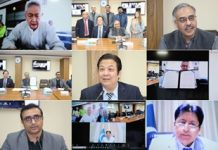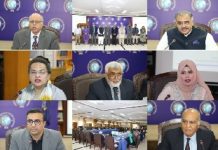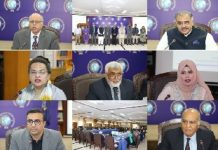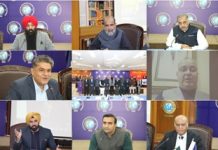Pakistan has been the nation most struck by terror since the September 11 attacks in 2001. But many crucial decisions are in limbo. The government wants a security dialogue with the Taliban at all costs to end the menace of terrorism. Military action is also underway, which is a reaction against the Taliban’s recent onslaughts in Karachi, Hangu, Kohat, Peshawar, Landi Kotal, and Islamabad.
Some political parties have been demanding stern military action against the Taliban. Yet many favor dialogue. The government decision to go ahead with talks with the Taliban despite the attacks is a big move. Perhaps it has exhausted other options.
Some political parties also asked for bans on political parties that sympathize with the Taliban who are active in the southern port city of Karachi. The city has become uncontrollable. Killings continue on a routine.
So far over 10,000 criminals and terrorists have been arrested but only 175 have been tried. Terrorism can only be wiped out if the arrested terrorists are sentenced in accordance with law.
But even the courts aren’t safe. The terrorist attack at a district court in Islamabad’s F-8 sector on March 3 left 11 people killed and 29 injured, including a judge who was inadvertently shot and killed by his police guard.
Unfortunately, the government did not beef up security measures prior to the attack. Police did not perform well at all, and many of them ran away from the scene without firing a single bullet.
The number of terrorists who attacked the courts in Islamabad remained a mystery. No single culprit was apprehended. The attack was the most serious in the past five years, and the government sources interpreted it as an attempt to sabotage the peace efforts with the Taliban.
The government has been in the process of devising the national security policy, which the Federal Cabinet approved on February 25. The policy says that between 2001 and November 2013, 48,994 people were killed. The policy, however, lacks a clear-cut vision on many crucial matters.
In the recent spate of violence in the country, many espionage agencies and terrorist groups could be involved.
The government’s track record of these incidents is not good in the past.
An unknown terrorist group Ahrar-ul-Hind, or Liberators of India, seemingly a splinter faction of the Tehrik-i-Taliban Pakistan (TTP), took responsibility for the court attack, but many accused the Taliban, the responsibility which they repeatedly denied.
Prime Minister Nawaz Sharif spoke of the possible involvement of the Indian Research and Analysis Wing behind the attack. He did not elaborate. But next day the Pakistan Ministry of Foreign Affairs denied such charges.
Just a few days before the attack, Interior Minister Chaudhry Nisar Ali Khan declared Islamabad a “safe city.”
But in spite of this security challenge, the government decided to continue dialogue with the Taliban by including the Pakistan army in their talks with the Taliban. A day before the attack in Islamabad, the Taliban announced a cease-fire.
The national security policy should immediately be implemented in letter and spirit and courts should be protected if verdicts were made against arrested terrorists. The Islamabad carnage is a dire security and police failure.
Besides, religious parties are not on the same platform. Strangely, Jamiat Ulema-e-Islam (Fazal-ur-Rehman Group), a religious political party and a coalition member of the government, has been constantly obstructing peace negotiations with the Taliban, ostensibly in conflict with the Jamiat Ulema-e-Islam (Sami-ul-Haq Group), which is heading negotiations from the Taliban side.
There are Taliban sanctuaries inside Afghanistan bordering Pakistan, but they are also still active inside Pakistan. The Afghan refugees living in slums in almost every part of Islamabad pose a serious threat to the life of citizens, especially when they would be mixed up with the internally displaced people if and when the government decides to start military operation in tribal areas. This is expected in July, depending on talks with the Taliban. Both people possess the same culture and speak the same Pashto language.
In a bid to resolve the security challenge, the government has decided to directly negotiate with the TTP by avoiding military operation. The interior minister has said that the majority of the Taliban are not anti-state, but there is a big question mark over this.
Many deals with militants have failed in the past. But given the state of the country, another path is needed. Peace talks should be given a chance.
Views expressed are of the author and do not necessarily reflect the views of ISS or of the Government of Pakistan.













